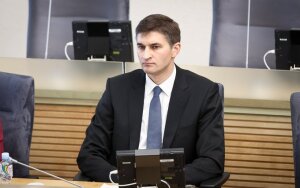- January 16, 2013
- 454
Niewierowicz: Competence above all

We receive great support from the government and the Seimas, and that should bring good results, said Jarosław Niewierowicz, the Lithuanian new head of the Ministry of Energy in the interview given for PL DELFI. We will make an attempt to implement such demands to the National Energy Strategy that would be palatable for both the government and the society, stressed the minister.
The Ministry of Energy is considered to be as on of the most problematic government departments. The building of an atomic power station, energetic bridges and LNG terminal – these are the questions that arouse stormy disputes in the society. What was your reaction to the proposal of becoming the head of the Ministry. Did you have any doubts?
Of course there are always some doubts, especially when it comes to the ministry being responsible for a very significant branch of economy and important field of the country’s functioning. Nevertheless, I believe that we have a big potential to manage this challenge. We have almost finished assembling the team that, in my opinion, will be competent. Apart from that we receive great support from the government and the Seimas, and that should bring good results.
What is your assessment of the first weeks as a head of the Ministry of Energy? What are the relations like with other members of the government?
The co-operation between the ministries is going very well. Everyone realizes our strategic objectives. The thing that made our work easier was, to a large extent, a qualitative discussion we had during the preparation of the programme.
What is the attitude of your fellow ministers to Polish minister? Polish-Lithuanian relations have recently left a lot to be desired.
At some level, such matters should be of no significance and competence ought to be above all. I would like it to be interpreted this way.
One of the fundamental demands that you had made was to depoliticize the energetic sector. Is this possible? Gazprom, for example, which dictates gas price to Lithuania is in fact a state enterprise belonging to Russian Federation and Kremlin has always used economy for economic purposes.
It is possible and I will do everything in order to make it happen since I cannot imagine to execute all the set goals without it. By the politicization I understand a permanent change of the targets and methods of attaining them. We will make an attempt to implement such demands to the National Energy Strategy that would be palatable for both the government and the society.
Biofuels are one of the pillars of Electoral Action of Poles in Lithuania (EAPL) and the government electoral programme. However, the costs of biofuels production are higher than those of conventional fuels. They are subsidized by the country very often, for example by means of the lower rates of an excise tax. What solutions are anticipated in Lithuania in order to popularize biofuels and not to charge the citizens excessively at the same time? Will biofuels strike predominantly the ordinary people?
I do not entirely agree when it comes to the costs of biofuels. Firstly, not the whole potential of production, reprocessing and competitive trade of biofuels is fully exploited. We ought to create a system giving the incentive to the local manufacturing and competition increase, which would also result in reducing the prices to the optimal level. The local governments where a biofuel has been introduced, already economize on heating. There is a certain problem with cogeneration where electric power is acquired from biofuels. A user still have to pay extra for such production; nevertheless, I believe that this also can be changed.
Tłumaczenie Barbara Rożek w ramach praktyk w Europejskiej Fundacji Praw Człowieka, www.efhr.eu. Translated by Barbara Rożek the framework of a traineeship programme of the European Foundation of Human Rights, www.efhr.eu.

